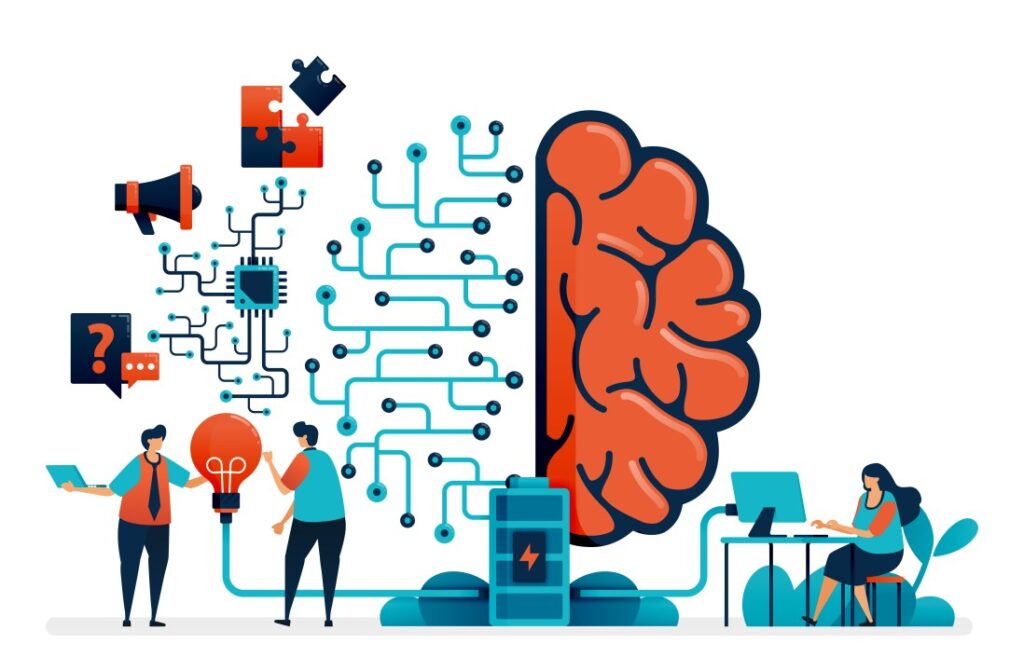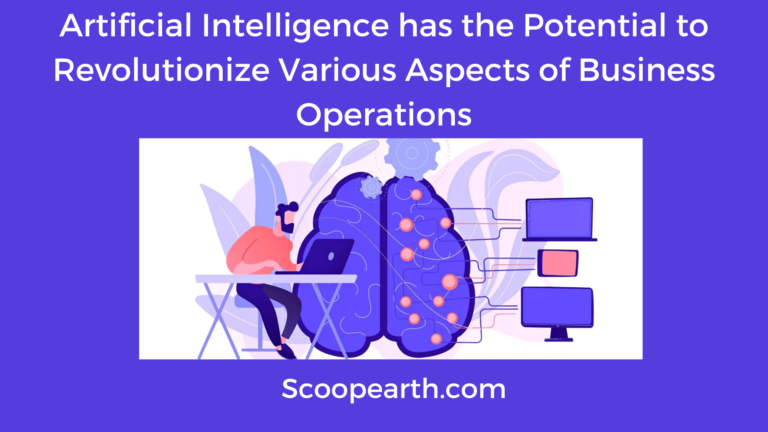Introduction:
1.Data Analysis and Insights: AI can quickly analyze vast amounts of data, identifying patterns, trends, and correlations that Artificial Intelligence humans may miss. This helps businesses gain valuable insights into customer behavior, market trends, and operational inefficiencies.
2. Predictive Maintenance: AI can predict equipment failures and maintenance needs by analyzing sensor data in real time. This helps businesses reduce downtime, extend the lifespan of equipment, and avoid costly repairs.
3. Supply Chain Optimization: AI can optimize the supply chain by forecasting demand, optimizing inventory levels, and identifying the most efficient routes for transportation and delivery.
4. Fraud Detection and Security: AI can enhance security measures by detecting unusual patterns in transactions and identifying potential fraudulent activities.
5. Chatbots and Virtual Assistants: AI-powered chatbots and virtual assistants can handle customer inquiries, provide support, and guide users through various processes, ensuring 24/7 availability.
6. Human Resources and Talent Management: AI can assist in talent acquisition by analyzing resumes, conducting initial candidate screenings, and even predicting employee turnover to proactively address retention issues.

Artificial Intelligence (Image Source: linkedin.com)
7. Sentiment Analysis: AI can analyze social media and customer feedback to gauge customer sentiment, helping businesses understand their reputation and address potential issues promptly.
8. Product and Service Improvement: AI can be used to gather and analyze user feedback to improve existing products and services or develop new offerings that align with customer needs.
9. Market Research and Competitive Analysis: AI can sift through vast amounts of market data to identify opportunities and potential threats, Artificial Intelligence aiding businesses in making informed strategic decisions.
Advantages Of Artificial Intelligence:
Artificial Intelligence (AI) offers numerous advantages across various aspects of business operations. Here are some of the key advantages:
1. Data Analysis and Insights: AI can process and analyze vast amounts of data quickly and accurately, providing valuable insights and patterns that can inform better decision-making.
2. Personalization and Customer Experience: AI enables businesses to deliver personalized experiences to customers, tailoring products, services, and recommendations based on individual preferences and behavior. This enhances customer satisfaction and loyalty.
3. 24/7 Availability: AI-powered chatbots and virtual assistants can provide round-the-clock customer support, ensuring that Artificial Intelligence customers can access assistance and information whenever they need it.
4. Cost Savings: Through process automation, AI can reduce operational costs by eliminating the need for manual labor in certain tasks and optimizing resource allocation.
5. Improved Decision Making: AI systems can process and analyze complex data sets to assist in strategic decision-making, helping businesses make data-driven choices with greater accuracy.
6. Predictive Capabilities: AI can predict future trends, demand patterns, and potential issues, allowing businesses to proactively address challenges and seize opportunities before they arise.
7. Enhanced Security: AI can bolster cybersecurity efforts by detecting and preventing potential threats, and safeguarding sensitive data and Artificial Intelligence systems from breaches and attacks.
8. Optimized Supply Chain Management: AI can optimize supply chain operations by predicting demand, optimizing inventory levels, and streamlining logistics, leading to reduced costs and improved efficiency.
9. Innovation and Creativity: AI can assist in generating new ideas, designs, and solutions by analyzing data and patterns from various sources, fostering innovation within the organization.
10. Faster and More Accurate Decision-Making: AI can process data and provide insights in real time, enabling businesses to make faster and more informed decisions.
11. Improved Healthcare and Diagnostics: AI can be used in healthcare to analyze medical data, assist in diagnostics, and recommend personalized treatment plans.
12. Efficient Recruitment and Talent Management: AI can help identify the right candidates for job roles, matching skills and qualifications Artificial Intelligence with job requirements more effectively.
13. Process Optimization: AI can analyze and optimize business processes, leading to smoother workflows and improved resource utilization.
14. Rapid Problem-Solving: AI can analyze large datasets and historical information to identify patterns and anomalies, helping businesses solve complex problems more quickly.
Overall, AI offers a transformative potential that can positively impact almost every aspect of business operations, leading to increased competitiveness, improved customer satisfaction, and sustained growth. However, it is essential for Artificial Intelligence businesses to adopt AI responsibly, considering ethical implications and ensuring data privacy and security in its implementation.
Disadvantages Of Artificial Intelligence:
While Artificial Intelligence (AI) offers significant advantages, it also comes with some disadvantages and challenges that businesses need to be aware of:
1. High Initial Costs: Implementing AI systems can be expensive, especially for small and medium-sized businesses. The development, training, and deployment of AI models often require substantial investment in hardware, software, and skilled AI professionals.
2. Data Dependency and Quality Issues: AI heavily relies on high-quality and large datasets for training and decision-making. If the data used to train AI models is biased or of poor quality, it can lead to biased or inaccurate results, impacting the effectiveness of AI applications.
3. Lack of Transparency: AI algorithms can be complex, making it challenging to understand how certain decisions are reached. The lack of transparency can be a concern, especially in critical applications such as healthcare or finance, where clear explanations for decisions are crucial.
4. Job Displacement and Workforce Impact: The automation potential of AI raises concerns about job displacement and its impact on the workforce. Some roles may become obsolete, leading to job losses for certain workers. Businesses need to consider upskilling and reskilling programs to help employees adapt to the changing job landscape.
5. Ethical and Legal Concerns: AI systems must be designed and implemented ethically to avoid perpetuating biases, discrimination, or privacy breaches. Ensuring that AI operates within legal frameworks and adheres to ethical guidelines is essential.
6. Security Risks: AI systems can become vulnerable to cyberattacks and hacking, potentially leading to data breaches and misuse of sensitive information.
7. Overreliance on AI: Relying too heavily on AI systems can lead to complacency among human operators, reducing their ability to critically assess situations and make independent decisions.
8. Unemployment and Economic Disruptions: As AI and automation become more prevalent, certain industries may experience significant disruptions, potentially leading to economic challenges in certain regions.
9. Limited Creativity and Intuition: While AI excels at processing and analyzing data, it lacks human qualities such as creativity, intuition, and emotional intelligence. These qualities are often essential in certain tasks and decision-making processes.
10. Regulatory Compliance: The introduction of AI into certain industries may require new regulations and standards to address potential risks and ensure responsible use.
11. Complexity and Integration Challenges: Integrating AI with existing systems and workflows can be complex and time-consuming, requiring careful planning and coordination.
12. AI Bias: AI systems can inherit biases from the data they are trained on, leading to unfair and discriminatory outcomes, particularly in areas such as hiring, loan approvals, or law enforcement.
To mitigate these disadvantages and maximize the benefits of AI, businesses should invest in proper training and education for their workforce, prioritize data quality and ethics, and carefully assess the risks and implications of AI implementations.
FAQs About Artificial Intelligence:
How is AI different from Machine Learning (ML)?
AI is the broader field of creating machines that can perform tasks intelligently. Machine Learning is a subset of AI that focuses on training machines to learn from data and improve their performance without explicit programming.
What are the main applications of AI in business?
AI finds applications in various business areas, including data analysis, customer service, supply chain optimization, personalization, fraud detection, and process automation.
What are the ethical concerns related to AI?
Ethical concerns about AI include issues of bias in algorithms, data privacy and security, job displacement, AI’s impact on decision-making, and potential misuse of AI technology for harmful purposes.
Can AI replace human jobs?
AI has the potential to automate certain tasks and jobs, leading to concerns about job displacement. While some jobs may be replaced, AI also creates new opportunities and can enhance human productivity and creativity.
How can businesses ensure AI systems are fair and unbiased?
To ensure fairness and reduce biases in AI systems, businesses should carefully curate training data, regularly assess AI models for bias, employ diverse teams in AI development, and implement fairness-aware algorithms.
What are some AI tools and platforms available for businesses?
There are various AI tools and platforms available, such as TensorFlow, PyTorch, IBM Watson, Google Cloud AI Platform, Microsoft Azure AI, and Amazon AI services, which businesses can use to develop and deploy AI solutions.
How can businesses get started with AI implementation?
Businesses can start with small AI pilot projects to understand the technology and its potential applications. They can also collaborate with AI experts or consider using AI-as-a-Service platforms to kickstart their AI initiatives.
Is AI only for large enterprises, or can small businesses benefit too?
AI is not limited to large enterprises; small and medium-sized businesses can also benefit from AI. There are AI solutions available that cater to different business sizes and requirements.
How can AI improve customer experiences?
AI can improve customer experiences through personalization, faster response times with chatbots, AI-driven product recommendations, and a better understanding of customer needs and preferences through data analysis.
Conclusion:
In conclusion, Artificial Intelligence (AI) holds tremendous potential for revolutionizing business operations, offering a myriad of advantages that can transform how companies function and engage with their customers.
Tackling issues like biased data, transparency, ethics, security risks, and workforce impact is imperative to ensure responsible and effective AI implementation.
The successful integration of AI necessitates a harmonious fusion of human expertise with AI capabilities. Prioritizing data quality, investing in AI training for the workforce, and adhering to ethical guidelines are essential components for the responsible and optimal use of AI.
By embracing AI as a powerful tool for innovation and problem-solving while remaining vigilant about its societal impact and workforce implications, businesses can harness AI’s transformative power to thrive in the digital era and contribute to a sustainable and inclusive future.
My name is Sai Sandhya, and I work as a senior SEO strategist for the content writing team. I enjoy creating case studies, articles on startups, and listicles.
